|
|
|
Sort Order |
|
|
|
Items / Page
|
|
|
|
|
|
|
| Srl | Item |
| 1 |
ID:
184474


|
|
|
|
|
| Summary/Abstract |
Religious identities based on both religious tradition and religious commitment have been increasingly influential in domestic U.S. politics for several decades, but the assumption remains that such identities are mostly unrelated to foreign policy. The authors suggest that domestic political incentives to expand the culture wars have combined with other trends, including the increasing use of unilateral executive power in foreign policy, to create an environment in which policymakers increasingly are tempted to make foreign policy based on domestic political incentives. Three case studies are highlighted: the “Mexico City” policy requiring foreign non-governmental organizations (NGOs) receiving U.S. aid money to pledge not to provide or educate about abortion, moving the U.S. embassy in Israel from Tel Aviv to Jerusalem, and efforts in the Trump administration to ban travel to the United States from majority-Muslim nations.
|
|
|
|
|
|
|
|
|
|
|
|
|
|
|
|
| 2 |
ID:
104341
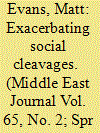

|
|
|
|
|
| Publication |
2011.
|
| Summary/Abstract |
This article challenges the traditional model of the media as a positive agent for political socialization. The increasing variety of news sources has reversed the role of the media, contributing to growing cultural fragmentation, rather than the unification of nations. One of the most volatile cultural cleavages in countries around the world is the clash between fundamentalist and secular members of the same religion. This work explores the role of the media in societal rifts through a study of the secular and religious press in Israel. The potentially divisive impact of the media has implications for other countries in the Middle East that are also characterized by religious-secular tensions.
|
|
|
|
|
|
|
|
|
|
|
|
|
|
|
|
| 3 |
ID:
094012
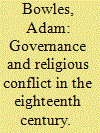

|
|
|
|
|
| Publication |
2010.
|
| Summary/Abstract |
Over the last couple of decades, it has become fashionable in some quarters to attribute the apparent rise of communal discord in colonial and post-colonial South Asia to the imposition on India of a 'modern secularist' ideology imported from the West. This foreign imposition, we are told, has undermined the conditions that enabled Indians associated with different religious and social identities to live side by side in relative harmony-conditions sometimes referred to as provided by something like (to paraphrase) a 'tradition of Indian tolerance rooted in its composite culture'.
|
|
|
|
|
|
|
|
|
|
|
|
|
|
|
|
| 4 |
ID:
094011
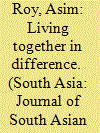

|
|
|
|
|
| Publication |
2010.
|
| Summary/Abstract |
If history is commonly viewed as a useful tool for seeking linkage between the past and present, the politics of colonial and post-colonial India has indeed come to place pre-colonial India at the centre of historical debates in contemporary India. Despite the relative dominance of the secular liberal nationalists in the colonial and the early decades of post-colonial India, the subsequent period saw the steady emergence and rise of the 'extremist' or 'militant' Hindu supremacist ideology of Hindutva-vad, the totalising, homogenising and unhistorical political-cultural construct of the notion of Hindutva (literally, the 'essence' of Hinduism or 'Hindu-ness'). The Hindutva-vadi (literally, the propagation of Hindutva-vad) has come to represent, in practical terms, an intolerant and violent Hindu majoritarian politics. In the name of redressing the alleged 'past wrongs and injustices' perpetrated on the contemporaneous Hindus by their 'medieval' Muslim conquerors, the Hindutva-vadi particularly target the minority Muslim community. The litany of those 'medieval' Muslim 'sins', in the eyes of today's Hindutva-vadi is long, and ranged from alleged discriminatory attitudes and measures, forced conversions, temple desecrations and destructions, construction of mosques at times on those ruined temples, to outright executions and slaughters.
|
|
|
|
|
|
|
|
|
|
|
|
|
|
|
|
| 5 |
ID:
143323
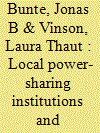

|
|
|
|
|
| Summary/Abstract |
News reports of clashes between Muslims and Christians in countries such as Nigeria are increasingly common. Yet, interreligious violence erupts only in some communities but not others. Under what conditions does religious identity become the fault line of communal violence? We argue that informal power-sharing institutions on the communal level are essential in shaping the incentives of potential perpetrators. We provide both qualitative and quantitative evidence for our claim that districts in which informal power-sharing agreements exist are less likely to experience interreligious violence. We conducted interviews with community leaders in 38 Nigerian districts to trace the process by which local power-sharing institutions exert influence on actors’ incentives to engage in religious violence. We complement this with quantitative analyses of a new dataset capturing interreligious violence on a subnational level. The analyses show that the overall degree of interreligious violence is significantly lower in districts with power-sharing than in those without. We also identify two causal mechanisms through which informal power-sharing institutions operate. First, these institutions affect the incentives of elites to appeal for cooperation. We show that the rhetoric of elites in districts with power-sharing is significantly more conciliatory. Second, power-sharing affects the general population’s perception of the interreligious tensions. Individuals living in districts with power-sharing institutions are less likely to experience religious diversity as threatening. Local-level informal power-sharing institutions are therefore an important foundation for communal peace and interreligious cooperation.
|
|
|
|
|
|
|
|
|
|
|
|
|
|
|
|
| 6 |
ID:
141347
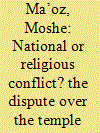

|
|
|
|
|
| Summary/Abstract |
Despite warnings from moderate Israeli and Palestinian religious and secular leaders, political leaders continue to perpetuate the conflict over the holy site.
|
|
|
|
|
|
|
|
|
|
|
|
|
|
|
|
| 7 |
ID:
116304
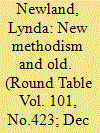

|
|
|
|
|
| Publication |
2012.
|
| Summary/Abstract |
Although Methodism has remained the dominant form of Christianity in Fiji, Methodist beliefs have been contested by a proliferation of Pentecostal/evangelical churches, but never more directly than by a new form of Methodism which flourished in the years up to 2009. This new church was called the New Methodist Church and, for a period in 2008 and 2009, the Fiji police forces were strongly encouraged to participate and finally to convert to it. This article is part of ongoing research that traces the alliances and challenges between Christianity and the state in Fiji.
|
|
|
|
|
|
|
|
|
|
|
|
|
|
|
|
| 8 |
ID:
052558


|
|
|
| 9 |
ID:
119932
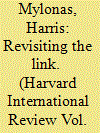

|
|
|
| 10 |
ID:
075067
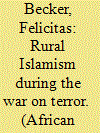

|
|
|
|
|
| Publication |
2006.
|
| Summary/Abstract |
In the Tanzanian country town of Rwangwa, a bitter confrontation has developed between Sufi Muslims and Islamist reformers. The Islamists draw on Middle Eastern inspiration, but the conflict arises equally from local, regional and national context, and is cultural as well as religious and political. Situated in an economically and educationally disadvantaged region, access to land and trade forms the focus of conflicts between the young (Islamists) and the older (Sufis). Islamists criticize the closeness of Sufis to government, which they accuse of discrimination against Muslims. The main objects of debate, though, are ritual and scripture. The Islamists reject Sufi burial rites and appeal to their superior knowledge of the Quran to justify their stance, reinforcing and profiting from the on-going transition from orality to literacy. While mainstream Muslim observers condemn the Islamists' aggressive posturing and opposition to authority, they accept their claim to superior learning and to possession of an Islamic alternative to western notions of progress.
|
|
|
|
|
|
|
|
|
|
|
|
|
|
|
|
| 11 |
ID:
106293
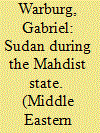

|
|
|
| 12 |
ID:
163438
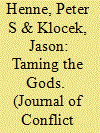

|
|
|
|
|
| Summary/Abstract |
Despite a robust literature on general forms of state repression, the determinants of religious repression remain unclear. This article argues that a regime’s experience with religious conflict will lead it to be more repressive of religious groups within its territory for three primary reasons. Religious conflict increases the behavioral threat posed by religious groups, lowers the cost of repressing these communities, and evokes vivid memories of past religious violence that underscore the role of the state in taming religion to maintain social order. New, cross-national data on religious conflict and repression from 1990 to 2009 show that religious conflict has a significant and positive effect on the level of religious repression for the time period under investigation, expanding the types and severity of government restrictions on religion in a country. Our findings point to the importance of studying the causes and nature of negative sanctions against religious communities, specifically.
|
|
|
|
|
|
|
|
|
|
|
|
|
|
|
|
| 13 |
ID:
173735
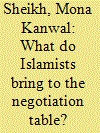

|
|
|
|
|
| Summary/Abstract |
Is religion the main reason why negotiations with Islamists fail? Contemporary international relations literature views compromise over religious claims as being particularly difficult compared to other types of claims. Religious conflicts are understood as unique phenomena. Do religious factors explain why successful conflict resolution attempts with Islamists are more difficult to achieve than with other insurgent groups who pursue non-religious claims? This article examines the case of the Pakistani Taliban and the types of demands they have made during peace talks and in their communications. The role of religion is examined in this article and, specifically, theories of scarce resources, indivisibility and securitization are analyzed to explain the difficulties of negotiating with Islamists.
|
|
|
|
|
|
|
|
|
|
|
|
|
|
|
|
|
|
|
|
|